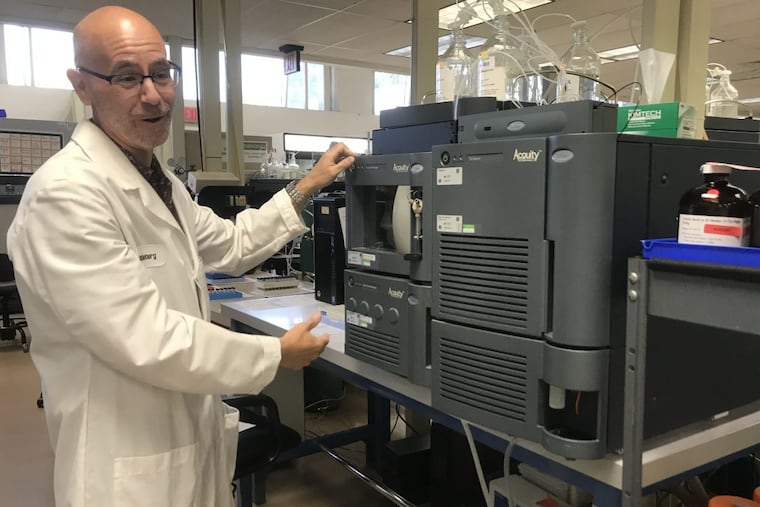Toes, bones and tissue offer a window on opioid epidemic at NMS Labs in Willow Grove
The opioid crisis ravaging the nation has fueled its explosive growth. The Willow Grove-based lab has become the dominant player in the realm of forensic toxicology. The number of tests NMS performs has rocketed by 50 percent in four years.

Thousands of parcels arrive throughout the day, mostly blood and urine packed in ice. There are also the occasional portions of human liver, kidney, and brain. Packages of toes, bones, vomit, and vitreous fluid from a victim's eyeball aren't uncommon. Some local law enforcement officers drop off their crime evidence in person.
The trucks with chilled cargo pull up every day starting at 9 a.m. at NMS Labs, the nation's premier toxicology laboratory, which operates 'round the clock through the week.
"You name it, we've gotten it," said lab director Robert Middleberg, dressed in a crisp white lab coat, as he surveyed a room full of technicians who process and log each new arrival. The solid materials are rendered into a slurry by a homogenizer, the samples placed into tiny vials, then shuttled off for analysis by a small army of chemists and biologists.
For nearly 50 years, privately held NMS Labs has operated out of a low-slung campus in Willow Grove. The complex, smack up against the Pennsylvania Turnpike and about 10 miles north of Philadelphia, will be moving soon. Considered the most comprehensive private forensic toxicology lab in the country, NMS is planning a major expansion that will take it a half-mile up the road to a facility twice the size.
The opioid crisis ravaging the nation has helped fuel NMS's explosive growth. The number of toxicology tests it performs has rocketed by 50 percent in the last four years, said Barry Logan, the lab's Scottish-born chief of toxicology.
"It's really accelerated because of the appearance of all the new opioids," Logan said. "Also, the population is increasing, more autopsies are being done, and there are many more deaths where drugs are involved."
NMS was founded in 1970 as National Medical Services by Fredric Rieders, a former chief toxicologist for the city of Philadelphia. Since then, its workforce has swelled to 350, and it has amassed a clientele that includes hundreds of medical examiners, coroners, hospitals, and lawyers, Middleberg said. It processes all the criminal forensic toxicology tests for the cities of Chicago and Detroit. Closer to home, it conducts tests for Montgomery County and wide swaths of Bucks County. NMS is called a "reference lab" because other lab directors refer work to NMS that they can't do or don't want to do themselves.
"There's not a state in the country that doesn't send us stuff," said Middleberg.
NMS handles about 120,000 cases a year. "The next largest handles maybe 10,000," Middleberg said. The cases aren't all opioid-related. The lab gauges blood-alcohol levels for DUI offenses. It investigates environmental as well as criminal poisonings. It is one of the few labs that can test for the newest versions of so-called synthetic cannabinoids. A secondary NMS lab in Willow Grove tests seized "powders, pills and potions." It has opened satellite labs in Florida, North Carolina and Texas.
"There are very few labs that have their capabilities," said Bruce A. Goldberger, president of the American Board of Forensic Toxicology. "Most don't have the $400,000 to $500,000 for the new instrumentation to test for the new drugs."
On occasion, NMS officials, including Logan and Middleberg, have been called to testify at celebrated trials, including those of accused killers O.J. Simpson, music producer Phil Spector and Casey Anthony.
But the sheer volume the lab handles gives NMS a rare vista on last year's estimated 59,000 fatal overdoses.
"We have more data about the opioid epidemic than any other lab in the country," Middleberg said. "We identify things out in the world before people even know they're taking them."
Synthetic opioids — which include deadly "fentalogs," varieties of fentanyl exponentially more powerful than morphine — are among the most commonly detected at NMS.
"We have twice the number coming up for fentanyls now as we do for heroin," Logan said. In the northeastern U.S., the number of positive tests for carfentanil, furanylfentanyl and U-47700, an opioid also known as "pink," has continued to trend upward, he said. "We're always looking for things that are new and unexplained."
Historically, new tests were rare, created three or four times a year when a pharmaceutical company introduced a new painkiller, anticonvulsant, or antipsychotic, Logan said.
"But with the advent of designer drugs, we're getting two or three new compounds a month," Logan said. Those include not only the fentalogs, but synthetic cannabinoids, new stimulants, and novel hallucinogenics.
"If we see something that's not supposed to be there, and it's not in the library," Logan said, "we have to apply some chemistry to find out what the new substance is."
Tammy Welch, a lab analyst in the confirmation department, prepared a batch of about 100 samples on a recent morning to test for opioids. Liquid chromatography, she explained, separates the compounds. Mass spectrometry does the detecting.
"We generally know what we're looking for," Welch said. But she is occasionally surprised. About five months ago, the lab began to encounter a surge in designer benzodiazepines, knock-offs of anti-anxiety drugs often used with opioids.
Middleberg, who has worked at NMS for 30 years, said he doesn't always need expensive lab equipment to detect a poison.
His nose knows. Though he can't detect opioids by scent alone, by smelling small amounts of "gastric contents," he can tell whether a victim was drinking beer, wine or distilled spirits. He said he can also pick out evidence of some pesticides.
"The younger people don't want to do it that way anymore," he said with a shrug and a smile. "I can understand why they don't."
More on NMS Labs: Like CSI — only real